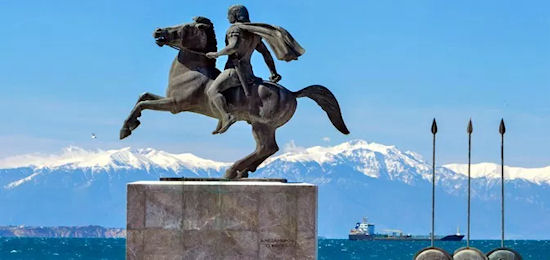The History of Alexander the Great is undoubtedly one of the most charming and beautiful chapters of Ancient Greek History. Alexander was a young King, who’s future and career were set to be configured in a complicated mix of coincidences and divine interventions. The life path that followed, joined by his amazing history-making and his insuperable achievements, including conquering all the Eastern (known to man at the time) World, fulfilled the signs that accompanied the time of his birth and the prophets who had foretold the coming of the Great King.
Some of the most unique and exceptional documents of those glory and nearly mythical days, that survived until today thanks to the references of Greek Ancient Writers, are the “Royal Journals”, daily Newspapers including incident reports occurring throughout the Macedonian Kingdom. “The Royal Journals” can correspond to what we call today “The Official Government Press”. In fact, those papers composed an official and accurate presentation of the daily political events that took place in the Macedonian Kingdom. In addition they are structural pieces of History and undeniably the most authentic source on those days that marked for ever our civilization.
Creation & Contents
Alexander established the mechanism for the production of the Royal Journals right before the passage of the combined Greek Army to the Asian mainland through Ellispontos, , He appointed as “chief editor” Eumenis the Kardianos, and Diodotos the Erithraios as Eumenis’s assistant. Apart from informing the Kingdom about military and political events, the “Royal Journals” included news of the King’s daily activities, great auditions and military arrangements, state economics etc. Every copy of the “Royal Journals” was kept in the King’s personal archive called “gazofilakion” and was classified to the masses. The only people that had access to the Journals were Alexander’s most trusted ministers and generals. After the King’s death all of the Journal copies would be stored in the King’s tomb along with his personal belongings. It seems that after Alexander died, a significant part of the “Royal Journals” were revised and publicized under the form of a folk narration about the deeds of the Great King.
The Royal Journals’ evidence
One of the writers that often refers to the Royal Journals’ evidence is Arrianos (95-180 a.c.). Arrianos, repeats many times in his 7 volumes the phrase “according to the Royal Journals”. It is worth mentioning that from all the contemporary writers that dealt with Alexander’s history only Arrianos makes a definite reference to the “Royal Journals”. Still, it is not clear whether Arrianos had direct access to the Journals or gathered citations from the work of other writers.
Newspapers in the Ancient Times
Even though only King Alexander’s Royal Journals are known today, we cannot say for sure whether they were an innovation. Some history researchers claimthat King Alexander’s Journals are part of an old local Macedonian tradition for creating newspapers. Those researchers say that the newspapers were named after each King that commissioned their publication. According to the researchers, the Journals were kept in Aiges, the old capital of the Macedonian Kingdom, where traditionally Macedonian Kings were buried.
Beyond the Macedonian Kingdom, Persian Kings also produced newspapers, as well as Egyptian Kings and other Eastern Kings. Throughout Ancient Greece, in cities like Athens, civil writers were responsible for recording the official news under the titles “The Local Letters” or “Memos”. In Ancient Rome from 48 b.c., by Julius Caesar’s command, until the fall of the Roman Empire (476 a.c.) papers called “acta diuma” or “acta senatus” were published. Those papers included news concerning state affairs and other information. Finally, a work titled “Newspaper of the Trojan War” by a Cretan called Diktis, is mentioned in the ancient Greek literature.
Nothing from the “Royal Journals” and the first history items concerning Alexander the Great and his marching to the East is saved today. All we know about his history come from later historians such as Arrianos and Ploutarhos who used the today lost works and tradition as sources. Today, we cannot be certain if those newspapers and the rest of Alexander’s personal archive were buried with Alexander in Alexander’s tomb. As history claims, Alexander’s corpse was meant to come to Macedonia in a Majestic Royal Coach so that Alexander could be buried next to the rest of the Macedon Kings. But Ptolemaios stole the dead King’s body and transferred it to Egypt where Alexander may still be resting.
If Alexander’s Royal Journals are found, although unlikely today, their discovery will be the reason to rewrite, almost 2000 years later, the story of the Macedonian Campaign as told by the King himself.





